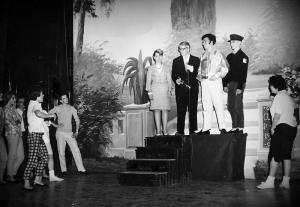
Source: Flickr user Northridge Alumni Bear Facts
License
In middle school, I played Albert in Bye Bye Birdie (1960), a musical loosely based on Elvis Pressley’s 1957 drafting into the US Army. When you participate in a show at such a formative age, the lyrics stick with you. I can’t sing well and yet the director thought it a good idea to cast me as a character with a handful of songs. These live within me, periodically emerging to remind me of the acting career that could have (but should not have) been. I can’t help but love the show.
As a result, I can’t help but revisit the authoritative cinematic version of Birdie: 1995’s made-for-TV adaptation, starring Jason Alexander as, of course, Albert. There is another more famous film based on the musical, one from 1963 starring Dick van Dyke (again, as Albert). I’d always kept this one at a distance, afraid of it for some unknown, almost supernatural, reason. Sometimes we should trust our instincts.
Bye Bye Birdie works because it so successfully conflates the worlds of pop culture and patriotism. Conrad Birdie, the show’s Elvis analogue, gets drafted, which puts his manager Albert Peterson in a difficult situation. Oppressed by his overbearing mother and unable to marry his longtime girlfriend and secretary (on account of his henpecking mom, you see), Albert will be without any income if Birdie ships out. He never wanted to work in the music business anyway; he wanted to be an English teacher. Rosie, his girlfriend, concocts a plan (again, based on real life) to have Birdie kiss a teenager in Ohio, the heart of the United States, making her a stand-in for all Birdie’s screaming fans—one last kiss on the Ed Sullivan Show. Such a stunt means big money for Albert and a final opportunity for them to escape the rat race.
The 1963 fil adaptation erases the sharper edges of this critique. Albert is not made a would-be English teacher; he’s a biochemist who invents a bizarre substance capable of speeding actions up (e.g., one dose makes a turtle run quickly). He uses his invention to undermine a Soviet ballet. The film entirely removes a song called “A Normal, American Boy,” in which Albert and Rosie fend off press questions about Birdie’s unsavory behavior. It totally erases his arrest for statutory rape at the end of the play.
In this movie, Conrad is essentially a decent, if occasionally dim-witted and selfish, guy rather than a cornfed youth whose appeal relies on an utterly false squeaky-clean image. And don’t even get me started on the removal of Rosie’s Hispanic heritage, which is reduced to her having worked at an enchilada restaurant, rather than being what it is in the musical: a racist reason for Albert’s mom to hate her.
I come into this, uh, review with expectations and biases. No question. And I can’t complain about everything. Some of the 60s’ goofiness, connected if only spiritually to Jerry Lewis, makes for good fun. But I can’t help feeling uneasy. What does it mean that Hollywood felt at liberty—maybe even felt compelled—to take a piece of art so capable of walking the line between mass entertainment and imminent critique and reducing it to wacky mad scientist fantasies about sabotaging the Moscow Ballet? What does it mean that this is the version most people seem to remember and adore? I don’t know; I don’t know. I just can’t quite put on a happy face about the whole thing.













